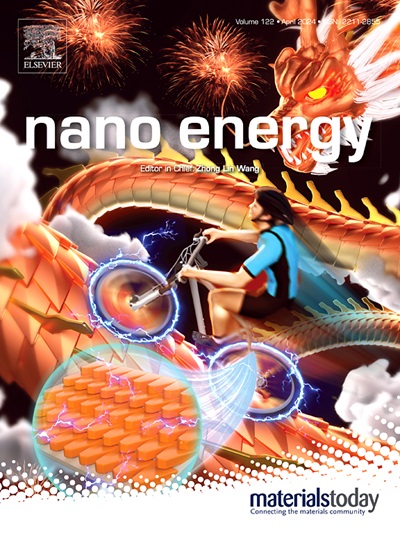Integrating machine learning with triboelectric nanogenerators: Optimizing electrode materials and doping strategies for intelligent energy harvesting
IF 16.8
1区 材料科学
Q1 CHEMISTRY, PHYSICAL
引用次数: 0
Abstract
The integration of machine learning techniques with triboelectric nanogenerators (TENGs) offers a transformative pathway for optimizing energy harvesting technologies. In this study, we propose a comprehensive framework that utilizes graph neural networks to predict and enhance the performance of TENG electrode materials and doping strategies. By leveraging an extensive dataset of experimental and computational results, the model effectively classifies electrode materials, predicts optimal doping ratios, and establishes robust structure–property relationships. Key findings include a 65.7% increase in energy density for aluminum-doped PTFE and an 85.7% improvement for fluorine-doped PTFE, highlighting the critical influence of doping materials and their concentrations. The model further identifies PTFE as a highly effective negative electrode material, achieving a maximum energy density of 1.12 J/cm with 7% silver (Ag) doping when copper (Cu) is used as the positive electrode. This data-driven approach not only accelerates material discovery but also significantly reduces experimental costs, providing novel insights into the fundamental factors influencing TENG performance. The proposed methodology establishes a robust platform for intelligent material design, advancing the development of sustainable energy technologies and self-powered systems.

集成机器学习与摩擦电纳米发电机:优化电极材料和掺杂策略的智能能量收集
机器学习技术与摩擦电纳米发电机(TENGs)的集成为优化能量收集技术提供了一条变革性的途径。在这项研究中,我们提出了一个综合框架,利用图神经网络来预测和增强TENG电极材料和掺杂策略的性能。通过利用广泛的实验和计算结果数据集,该模型有效地对电极材料进行分类,预测最佳掺杂比,并建立稳健的结构-性能关系。主要发现包括掺铝PTFE的能量密度提高了65.7%,掺氟PTFE的能量密度提高了85.7%,突出了掺杂材料及其浓度的关键影响。该模型进一步确定了PTFE是一种高效的负极材料,当使用铜(Cu)作为正极时,当掺杂7%银(Ag)时,PTFE的最大能量密度为1.12 J/cm22。这种数据驱动的方法不仅加速了材料的发现,而且显著降低了实验成本,为影响TENG性能的基本因素提供了新的见解。所提出的方法为智能材料设计建立了一个强大的平台,促进了可持续能源技术和自供电系统的发展。
本文章由计算机程序翻译,如有差异,请以英文原文为准。
求助全文
约1分钟内获得全文
求助全文
来源期刊

Nano Energy
CHEMISTRY, PHYSICAL-NANOSCIENCE & NANOTECHNOLOGY
CiteScore
30.30
自引率
7.40%
发文量
1207
审稿时长
23 days
期刊介绍:
Nano Energy is a multidisciplinary, rapid-publication forum of original peer-reviewed contributions on the science and engineering of nanomaterials and nanodevices used in all forms of energy harvesting, conversion, storage, utilization and policy. Through its mixture of articles, reviews, communications, research news, and information on key developments, Nano Energy provides a comprehensive coverage of this exciting and dynamic field which joins nanoscience and nanotechnology with energy science. The journal is relevant to all those who are interested in nanomaterials solutions to the energy problem.
Nano Energy publishes original experimental and theoretical research on all aspects of energy-related research which utilizes nanomaterials and nanotechnology. Manuscripts of four types are considered: review articles which inform readers of the latest research and advances in energy science; rapid communications which feature exciting research breakthroughs in the field; full-length articles which report comprehensive research developments; and news and opinions which comment on topical issues or express views on the developments in related fields.
 求助内容:
求助内容: 应助结果提醒方式:
应助结果提醒方式:


